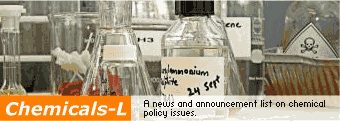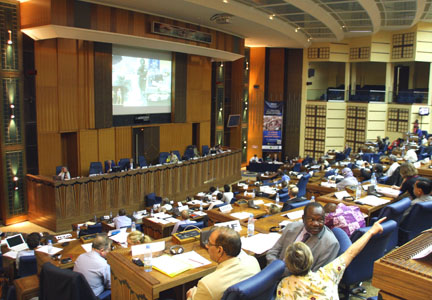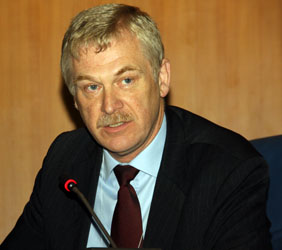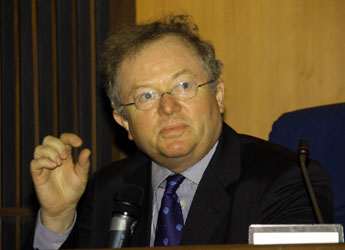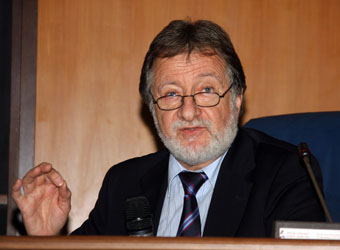|
|
NANOTECHNOLOGY AND MANUFACTURED
NANOMATERIALS:
|
|
|
|
|
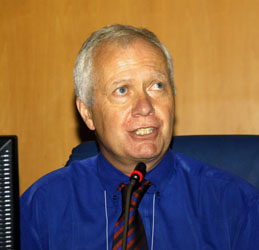 |
|
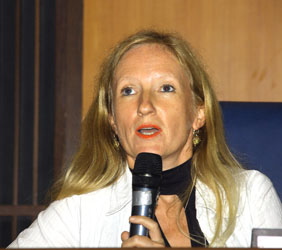 |
|
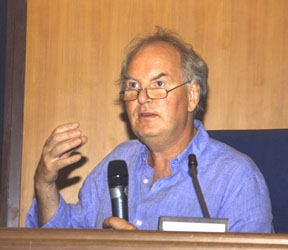 |
| Pat
Mooney,
ETC Group, emphasized that the way in which a
technology is introduced is critical for its
socioeconomic impact, especially to marginalized
people. |
|
|
| Claudia
Neubauer,
Citizen Sciences Foundation, emphasized that science
and technology are situated in a specific historical
context and thereby subject to human choices. She
lamented the small budgets for research into the
social implications of nanotechnology and for products
beneficial to marginalized people. |
|
|
| Pieter
van Broekhuizen,
University
of
Amsterdam
discussed possible challenges and risks for workers posed
by nanotechnologies. |
|
|
|
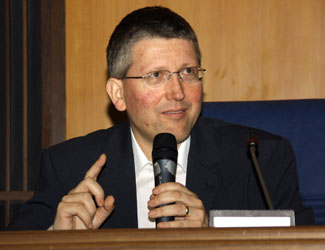 |
|
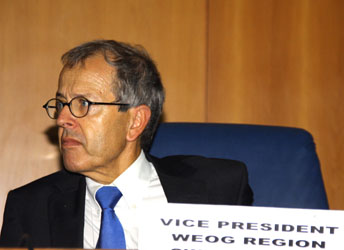 |
| Andreas
Bachmann,
Switzerland, discussed the possibility that advances
in nanotechnology could exacerbate a divide between
developing countries without access to such technology
and those countries which are able to invest in
research and development. |
|
|
| Georg Karlaganis,
Switzerland, facilitated the plenary session on nanotechnology. |
|
|
|
|
RELEVANT ACTIVITIES IN INTERNATIONAL
ORGANIZATIONS:
|
|
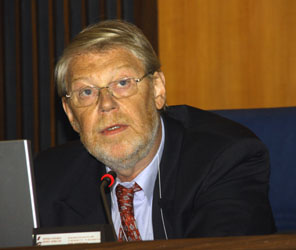 |
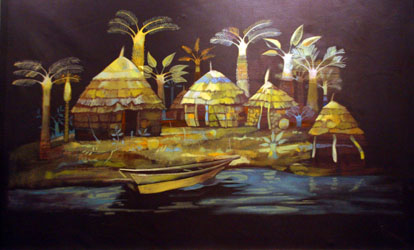 |
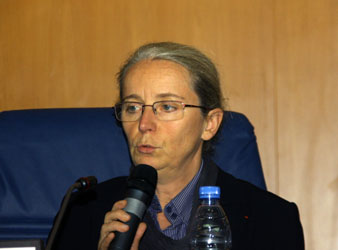 |
| Robert
Visser,
Organization for Economic Cooperation and Development
(OECD), outlined OECD's activities on
nanotechnology, focusing on the working party on
nanotechnology and manufactured nanomaterials. |
|
| Artwork depicting a
traditional Senegalese seaside landscape. |
|
| Francoise
Roure, OECD Working Group on Nanotechnology,
suggested strengthening intergovernmental dialogue on
nanotechnology and creating a system for formal
coordination among UN agencies. |
|
|
|
|
SCIENCE AND POLICY CHALLENGES IN
DEVELOPED AND DEVELOPING COUNTRIES:
|
|
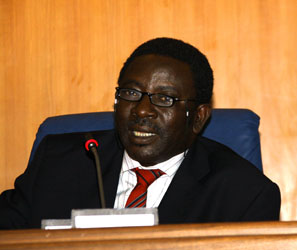 |
|
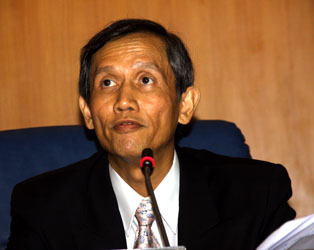 |
|
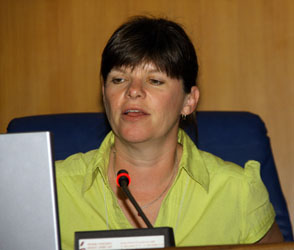 |
| Adeniyi
Fasasi,
National Agency for Science and Engineering Infrastructure of Nigeria, presented on the status of and progress on
nanotechnology in Nigeria, stressed the need for
capacity building, awareness raising and funding for
nanoresearch in Africa, and emphasized the need for, inter alia, linkages between universities, research institutions and
industry. |
|
|
| Lerson
Tanasugarn,
Chulalongkorn
University
, discussed developments in nanotechnology in
Thailand
, noting that the country is working to be an informed
consumer and socially-responsible manufacturer. |
|
|
| Jane
Stratford, UK, explained her country's approach
to governing the development and application of
nanotechnologies. She emphasized that because
nanomaterials have different characteristics and
therefore pose different risks, they should be
evaluated on a case-by-case basis.
|
|
|
|
|
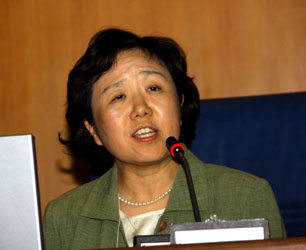
|
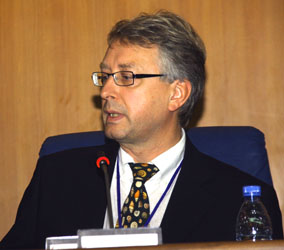 |
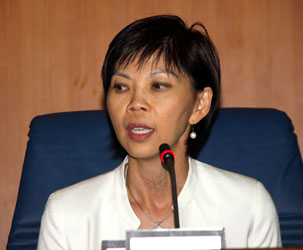
|
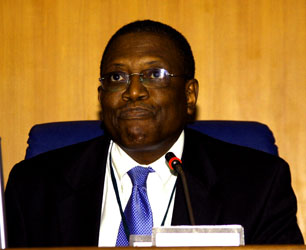 |
| Kyung-Hee
Choi, Republic
of
Korea, said her country was a leader in nanotechnology
research and use, and emphasized that nanosafety
research on manufactured nanomaterials has the highest
priority. |
|
| Thomas
Epprecht, Swiss Reinsurance Company, discussed how
the insurance industry manages the risk from the
emergence of nanotechnology and profits from such
activities. |
|
| Noppawan
Tanpipat, National Nanotechnology Center of
Thailand, presented on the role of the center and code of
conduct for responsible nanotechnology in her country. |
|
| Babajide
Alo, University
of
Lagos
, noted the limited participation of developing
countries, especially those at the bottom of the Human
Development Index, in the development and direction of
nanotechnology. |
|
|
|
|
WORKING GROUPS:
|
|
|
FUTURE OF IFCS:
|
|
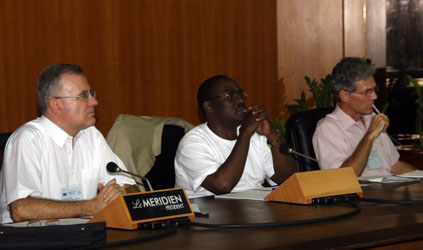 |
|
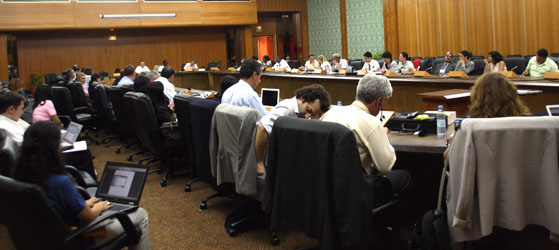 |
|
|
| The
working group on the future of IFCS convened in an evening
session. |
|
|
|
|
|
NANOTECHNOLOGY:
|
|
|
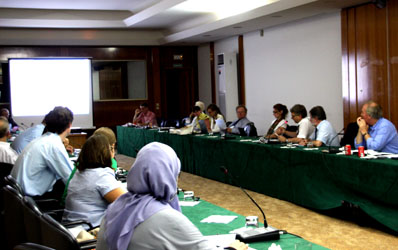 |
|
|
The
working group on nanotechnology met on Tuesday evening. Chair Karlaganis
presented a draft text for a Dakar Declaration on
Nanotechnology and Manufactured Nanomaterials. |
|
|
|
 |
| Artwork depicting
Senegalese wildlife. |
|
|
|
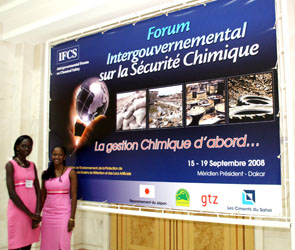
|
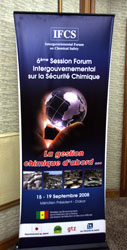
|
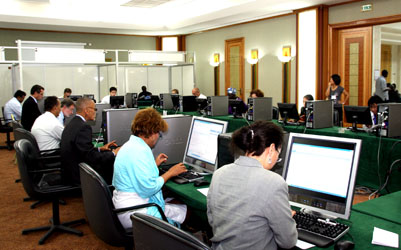 |
| Local staff in
front of the IFCS VI banner. |
|
Delegates busy at
the cybercafé. |
|
|
|
